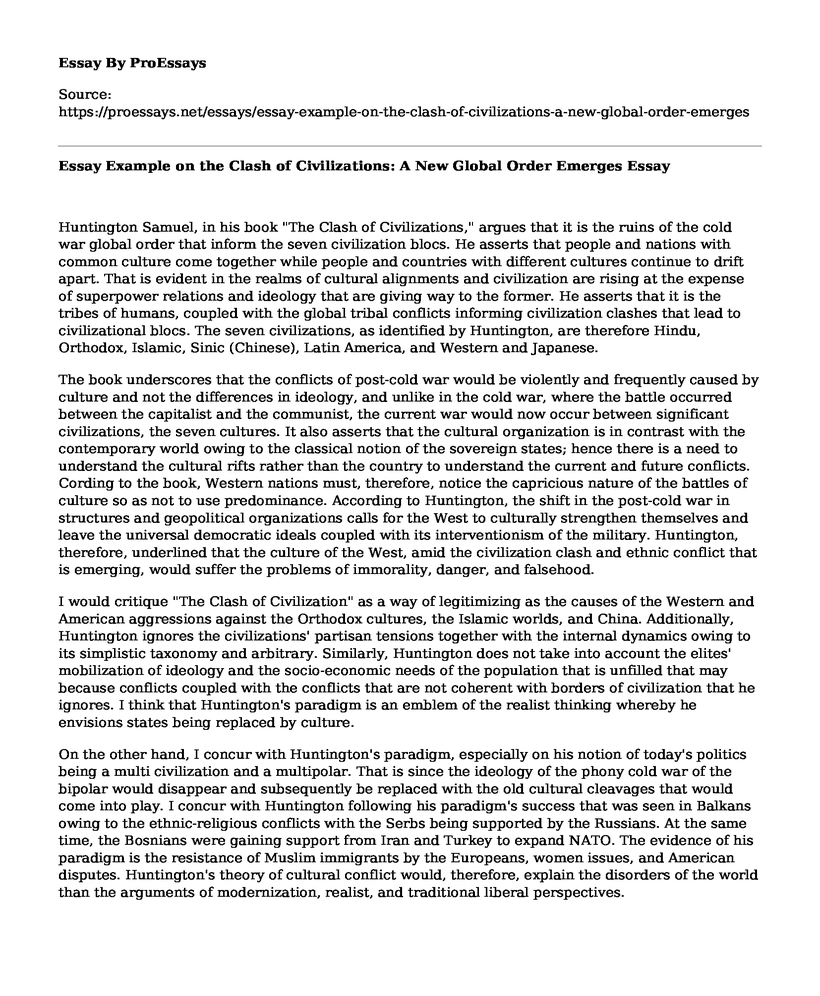Huntington Samuel, in his book "The Clash of Civilizations," argues that it is the ruins of the cold war global order that inform the seven civilization blocs. He asserts that people and nations with common culture come together while people and countries with different cultures continue to drift apart. That is evident in the realms of cultural alignments and civilization are rising at the expense of superpower relations and ideology that are giving way to the former. He asserts that it is the tribes of humans, coupled with the global tribal conflicts informing civilization clashes that lead to civilizational blocs. The seven civilizations, as identified by Huntington, are therefore Hindu, Orthodox, Islamic, Sinic (Chinese), Latin America, and Western and Japanese.
The book underscores that the conflicts of post-cold war would be violently and frequently caused by culture and not the differences in ideology, and unlike in the cold war, where the battle occurred between the capitalist and the communist, the current war would now occur between significant civilizations, the seven cultures. It also asserts that the cultural organization is in contrast with the contemporary world owing to the classical notion of the sovereign states; hence there is a need to understand the cultural rifts rather than the country to understand the current and future conflicts. Cording to the book, Western nations must, therefore, notice the capricious nature of the battles of culture so as not to use predominance. According to Huntington, the shift in the post-cold war in structures and geopolitical organizations calls for the West to culturally strengthen themselves and leave the universal democratic ideals coupled with its interventionism of the military. Huntington, therefore, underlined that the culture of the West, amid the civilization clash and ethnic conflict that is emerging, would suffer the problems of immorality, danger, and falsehood.
I would critique "The Clash of Civilization" as a way of legitimizing as the causes of the Western and American aggressions against the Orthodox cultures, the Islamic worlds, and China. Additionally, Huntington ignores the civilizations' partisan tensions together with the internal dynamics owing to its simplistic taxonomy and arbitrary. Similarly, Huntington does not take into account the elites' mobilization of ideology and the socio-economic needs of the population that is unfilled that may because conflicts coupled with the conflicts that are not coherent with borders of civilization that he ignores. I think that Huntington's paradigm is an emblem of the realist thinking whereby he envisions states being replaced by culture.
On the other hand, I concur with Huntington's paradigm, especially on his notion of today's politics being a multi civilization and a multipolar. That is since the ideology of the phony cold war of the bipolar would disappear and subsequently be replaced with the old cultural cleavages that would come into play. I concur with Huntington following his paradigm's success that was seen in Balkans owing to the ethnic-religious conflicts with the Serbs being supported by the Russians. At the same time, the Bosnians were gaining support from Iran and Turkey to expand NATO. The evidence of his paradigm is the resistance of Muslim immigrants by the Europeans, women issues, and American disputes. Huntington's theory of cultural conflict would, therefore, explain the disorders of the world than the arguments of modernization, realist, and traditional liberal perspectives.
Cite this page
Essay Example on the Clash of Civilizations: A New Global Order Emerges. (2023, Mar 28). Retrieved from https://proessays.net/essays/essay-example-on-the-clash-of-civilizations-a-new-global-order-emerges
If you are the original author of this essay and no longer wish to have it published on the ProEssays website, please click below to request its removal:
- Lifespan Development: Adolescence
- Essay Example on Moral Therapeutic Deism and Adolescent Development
- Compare and Contrast Between Older Generation and Younger Generation
- Theory of Knowledge: Doubt Is the Key of Knowledge Essay
- Effect of Childhood Abuse on Adult Emotional Development Essay Example
- Roots and Elements of Western Civilization Essay Example
- Essay Example on Social Learning Theory: The Foundation of Human Behavior







